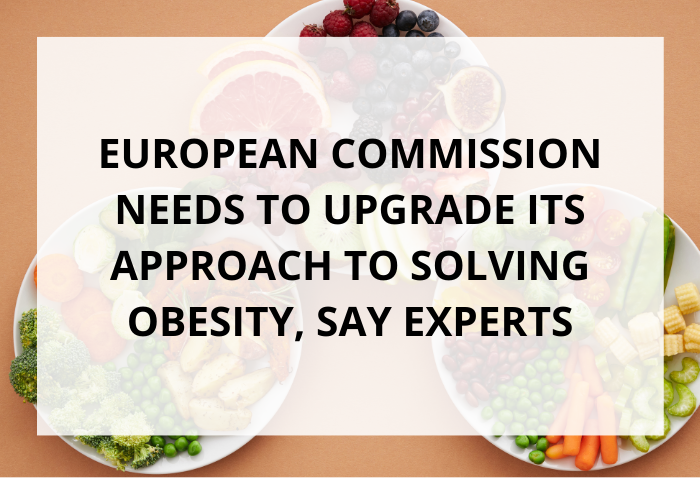European Commission needs to upgrade its approach to solving obesity, say expertsPRESS RELEASE
- 17 April 2024
- Posted by: Competere
- Categories: events, highlights, News, Obesity & NCDs, SUSTAINABLE NUTRITION

Leggi il comunicato stampa in italiano
EUROPEAN COMMISSION NEEDS TO UPGRADE ITS APPROACH TO SOLVING OBESITY, SAY EXPERTS
***
Brussels, 17th April 2024. Innovative approaches to solving the global obesity pandemic were discussed today at a symposium held by the European policy institute Competere.eu, together with Rosa D’Amato MEP of the Greens / EFA political group at the European Parliament.
«Today’s obesity crisis exacts a significant toll on human health, social cohesion, and economic vitality, undermining productivity and overall societal well-being. Current trends could herald an unprecedented decline in life expectancy in Western countries by the end of this decade, marking a historical reversal in human health advancements », said Pietro Paganini, Competere.eu chairman and author of “IFood: the perils of food standardization”. «Existing policies and strategies, particularly the European Union’s focus on Front-of-pack labelling, have failed to yield meaningful results.”, he stated. The symposium “Obesity: The Invisible Pandemic” invited experts in obesity research from the University of Milan, University of Antwerp, and the University of Gastronomic Science, together with representatives from the Spanish National Research Council and Food & Drink Europe to share views on the root causes of obesity, and solutions to the global crisis.
Multiple speakers warned that obesity is the most important issue facing human beings in the coming years. Obesity amongst children is particularly of concern because of the array of NCD diseases and shortened life expectancy that often result.
Hosting the symposium Green / EFA MEP Rosa D’Amato said “Obesity is not merely a matter of personal health but a societal issue that demands our urgent attention and collective action. Numbers are rising and we urgently need this issue to be tackled.”
Prof. Luc Van Gaal, University of Antwerp explained the multifactorial contributing factors of obesity, including lifestyle, nutrition, physical outlined activity, genetics, sleep quality, inflammation, gut microbioma, endocrine disruptors, medication, toxic environments and even global warming. Prof. Donatella Saccone, University of Gastronomic Sciences added that food security – encompassing food availability, access to food, food utilization and stability – is another critical contributing factor that needs addressing by policy-makers.
Prof. Michele Carruba, University of Milan explained «Obesity is a true disease, chronic and recurrent, potentially deadly and an epidemic. It is not simply due to a vicious lifestyle, characterized by excess food. Instead, it is attributable to the malfunction of the homeostatic mechanism regulating energy metabolism. Failure to address this issue will make the economic sustainability of all national healthcare systems unmanageable. Therefore, it is necessary to promote a culture of proper nutrition. We must educate children in schools, from the earliest months of life, on dietary education and a healthy lifestyle».
Speakers were united in their view that existing policies championed by the European Commission fail to address the multiple factors that contribute to obesity. A narrow focus on front-of-pack nutritional labelling fails to produce meaningful results. Such measures are not only ineffective, but negatively impact the economy and individual autonomy. Paganini declared “Instead, the EU must adopt a new stance on obesity, embracing the diverse and innovative solutions that science and technology offer.”
“We are committed to advocating for policies that enable citizens across Europe and globally to tailor their diets individually”, said Paganini, citing the latest advancements in science and technology which advocate moving beyond the outdated ‘one size fits all’ model.
Concluding the symposium, Paganini urged the EU to upgrade its approach to obesity. The EU needs to recognize that obesity is a malnourished chronic disease, and understand that it is a multifaceted issue. Paganini called on the Commission to develop broader, more innovative policies, by leveraging advancements in science and technology to tackle the problem. Such an innovative approach would avoid implementing outdated stop-gap arrangements that will inevitably prove ineffective, and lead to negative consequences for Europeans, their values and regional diversities, as well as European economies.
Together with the Università degli Studi di Milano (University of Milan), Competere.eu has launched an International Alliance Against Obesity (IAAO). This permanent roundtable aims to develop the formation of a multidisciplinary and international community of scientific experts capable of addressing the issue of excess malnutrition from a wide range of perspectives, and to develop effective solutions to a complex problem. IAAO thought-leaders see obesity rooted in a complex array of factors, far beyond the simple matter of what people eat. They believe that if policy-makers shifted their focus to the multiple factors that lead to obesity, more effective solutions could be implemented.
